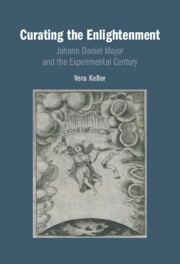Book contents
8 - Experimental Philosophy
from Part IV - Spaces of Knowledge
Published online by Cambridge University Press: 07 December 2024
Summary
Experimental philosophy was institutionalized as a discipline in Central Europe with the first seminars and professorships. Major requested but did not receive a professorship in this discipline, yet he taught one of its first seminars. At the beginning of each meeting, Major lectured on experimental norms, but then spent most time experimenting upon objects in his collection in a purposefully nonmethodical way. The seminar integrated current research by Major and his students. Whirling from one experiment to the next, Major dramatized shifting, probabilistic knowledge and tried to lure students away from a priori systems. He often deployed phenomena from global craft or even street performances, but he distinguished experimental philosophy as a liberal discipline from its application to use. Major’s son-in-law, Wilhelm Ulrich Waldschmidt, became the first chair of experimental philosophy in Kiel in 1693. He taught many of the same experiments as Major, but, like others of his generation, he rearranged them to lend experimental philosophy a much more methodical air. A pedagogical presentation of experimental method developed distinct from the practice of experimental research.
Keywords
- Type
- Chapter
- Information
- Curating the EnlightenmentJohann Daniel Major and the Experimental Century, pp. 243 - 292Publisher: Cambridge University PressPrint publication year: 2024

